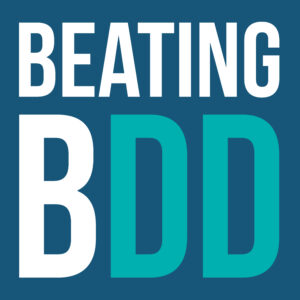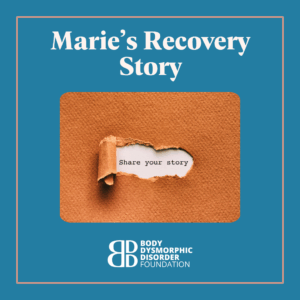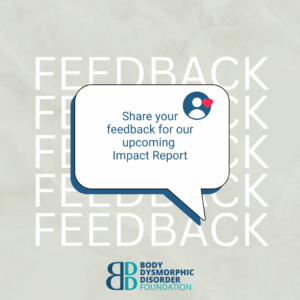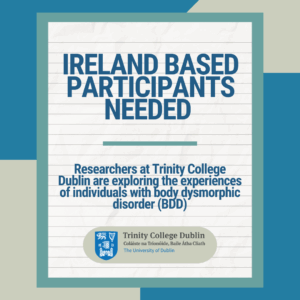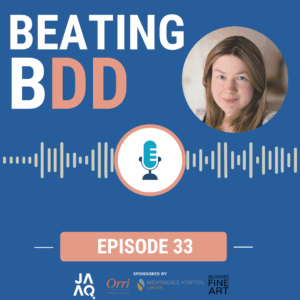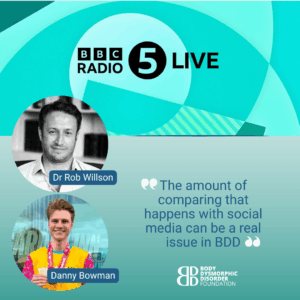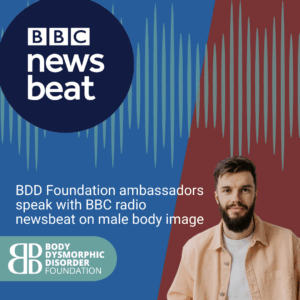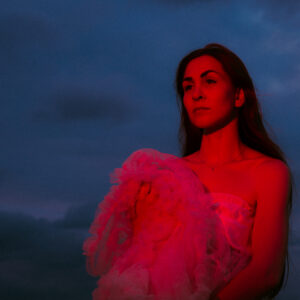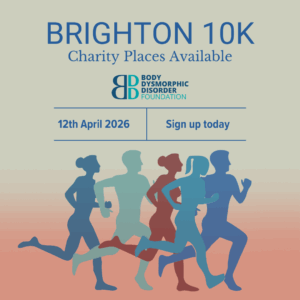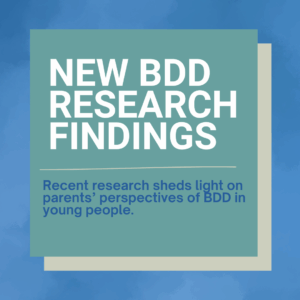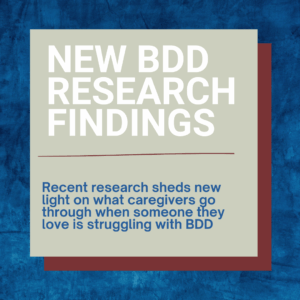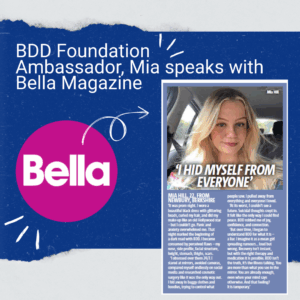I have learnt not to make demands on myself to look or be a certain way to be accepted. It is ‘enough’ just to be me, and I am grateful for the life I am now living which could so easily have been lost.
I now realise that I experienced symptoms of BDD from a very early age. I was always sensitive and self-conscious and felt that I was different from the other girls. My confidence increased slightly when I reached my mid-teens and I was able to camouflage my appearance with make-up, and straighten and control my hair. With the arrival of a few boyfriends and my marriage at 18 I felt a little more ‘normal’, but by this time the obsessive behaviours had set in.
At 21 my marriage broke down and I became severely depressed. At that point BDD took over my life. I was so repulsed and disgusted by my appearance that I thought no one would ever want me again. My parents took me to the GP who treated me for depression and prescribed Valium. The BDD and depression became so unbearable that I took an overdose and was then referred to a psychiatrist. The next seven years of my life were spent in and out of hospital, trying countless different types of medication. But the symptoms persisted and I took more overdoses. I explained that I felt distressed because of the way that I looked, but I was dismissed. This increased my feelings of embarrassment and shame and I felt that I was also a ‘sinner’ for worrying so much about the way that I looked. The BDD increased and my life revolved around the level of satisfaction I could achieve with the never-ending cycle of camouflage.
“I felt repulsive and hideous and didn’t feel that I looked human or deserved to live.”
When I reached 28 I met my second husband and the years that followed were much better, with the distraction of my home, children, and career. Social activities were still affected, as it was difficult to be around others who were attractive and therefore ‘adequate’, unlike myself. Then, at 45, things took a serious turn for the worse with the failure of my second marriage, and the BDD became severe. I began checking my refection in the mirror for up to four hours at a time. I felt repulsive and hideous and didn’t feel that I looked human or deserved to live. I would constantly compare myself to others and to old photographs, always focusing on what I considered to be my worst features, for several hours at a time.
I thought about my ugly appearance every moment of the day, and again became suicidal. I couldn’t talk to family and friends about my feelings because I was frightened that they would think that I was vain, or mad. I couldn’t understand how anyone could bear to look at me and not recoil in horror. I was being treated at this time by a psychiatrist who tried different medications, including anti-psychotics, and referred me to two different psychologists who didn’t help at all. I was not offered CBT, and no one seemed able to help me.
“I visited the beauty salon and spent over £300 on the treatment”
Then I saw an advertisement in the local paper for a ‘non-surgical facelift’ and I visited the beauty salon and spent over £300 on the treatment. Any positive results were short-lived but it was at this time that the owner started to talk to me about cosmetic surgery. Despite having these disturbing thoughts about my appearance I hadn’t really thought about it before. But the more I researched it the more I was convinced that it might just save my life. This seemed my last chance.
Having once made up my mind I wanted surgery immediately, and I arranged an appointment with a surgeon within days. My main appearance concern at this time was lines on my face, although over the years I had focused on my eyes and my hair. I went into hospital two weeks later and had a facelift and lower-eye surgery at a cost of £3,500. I wasn’t nervous or hesitant at all. This was an emergency, and although I was battered and bruised afterwards it didn’t matter: there was at least some hope, or so I thought. As the days passed and my face healed I could still see imperfections on my face and my anxiety soared. I scrutinised every area of my face and was convinced that I had made things worse and now it was ‘all my own fault’. How could I have been so stupid?
Within months I was back at the clinic, having injectable fillers that were very painful and expensive, and only lasted a few months. The next year I went back into hospital for more surgery: another £3,000 for tissue implants under the lines and more eye surgery. Afterwards I felt the same. Disgusted by my appearance and horrified at what I had done. Despite all this, and because my BDD was so bad, I continued with injectable fillers and spent a fortune on various products over the next two years.
This unhealthy cycle of behaviour carried on until the year 2000. I was suicidal and didn’t know where to turn. I was still seeing a psychiatrist, and a psychologist, but my BDD remained undiagnosed. The psychologist discharged me after pointing out that despite all the help I had had from mental health professionals and cosmetic surgery intervention no one could help me. I returned home feeling that the end had come. I survived another overdose around that time, but it was followed by a spell of taking tablets day and night, because I could not stand the torturous thoughts.£8,500 for another face-lift, chin tuck, eye-brow lift and laser treatment.
“I returned home feeling that the end had come.”
I decided to give cosmetic surgery another chance. After all, it may just ‘work’ this time, and if it didn’t I would end my life, which seemed inevitable anyway. Again, having made up my mind, I went to see a different surgeon and was operated on within the week, taking a cancellation slot. The surgery was more costly this time, £8,500 for another face-lift, chin tuck, eye-brow lift and laser treatment. The money didn’t matter though. I cashed in my mortgage endowment policy without a second thought.
As is usually the case (I know now) I felt worse afterwards, and whilst nothing much had improved there were now new areas of concern. It was at this time that I saw a TV programme about a girl who didn’t like the way she looked, and who had a condition called BDD. I couldn’t believe that I was not the only one who felt this way, and I phoned the helpline and got information about BDD from OCD Action. Now, nearly seven years on, after years of excellent CBT treatment from David Veale and Rob Willson, I understand that all the surgery I had was not helpful at all. It made my BDD worse and far more dangerous.
I have learnt not to make demands on myself to look or be a certain way to be accepted. It is ‘enough’ just to be me, and I am grateful for the life I am now living which could so easily have been lost.
More stories from the community
